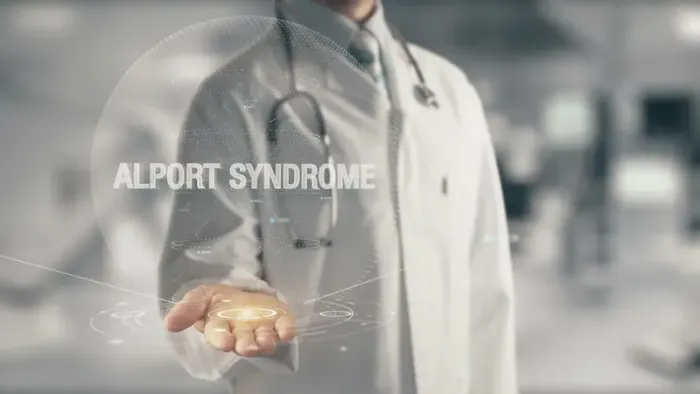Alport Syndrome Diagnosis Recognising the Signs and Getting Answers
Learn how Alport Syndrome is diagnosed, from early signs like haematuria and hearing loss to genetic testing, inheritance patterns, and why early detection is key.

Written by Dr. Mohammed Kamran
Reviewed by Dr. Rohinipriyanka Pondugula MBBS
Last updated on 22nd Sep, 2025

Introduction
Noticing a pink or cola-coloured tinge to your urine can be a frightening experience. While often benign, persistent blood in the urine (haematuria), especially when paired with hearing loss in young adulthood, can be a sign of something more complex: a genetic condition called Alport Syndrome. This inherited disorder affects the tiny filters in your kidneys, ultimately impacting your hearing and vision. Understanding what leads to the signs of Alport Syndrome is the first critical step towards a diagnosis. This guide will walk you through the genetic causes, the key symptoms to watch for, and the detailed diagnostic process, empowering you with the knowledge to seek the right medical help and manage the condition effectively.
What is Alport Syndrome? The Genetic Foundation
Alport Syndrome is not an illness you catch; it's a genetic story written into your DNA from birth. It is a rare inherited disorder that primarily damages the tiny blood vessels in the kidneys, but its effects can also echo in the ears and eyes. At its heart, Alport Syndrome is a collagen disease. Specifically, it involves a problem with type IV collagen, a crucial structural protein that acts as scaffolding in certain tissues.
The Role of Collagen IV in Your Body
Think of the filters in your kidneys (glomeruli) as a sophisticated sieve. The walls of this sieve are made up of a delicate meshwork, and type IV collagen is the primary building block of this mesh. In a healthy body, this collagen meshwork is strong and organised, perfectly filtering waste into the urine while keeping important proteins and blood cells in the bloodstream.
The Genetic Mutations at the Core
In people with Alport Syndrome, a mutation occurs in one of the genes responsible for producing type IV collagen. These genes are called COL4A3, COL4A4, and COL4A5. This genetic error leads to the production of abnormal collagen IV. Over time, this faulty scaffolding becomes weak, frayed, and unable to perform its filtering job effectively. This fundamental breakdown is what leads to all the classic signs and symptoms of the syndrome.
The First Clues: Early Signs and Symptoms of Alport Syndrome
The symptoms of Alport Syndrome are directly caused by the deterioration of collagen IV in specific organs. They often appear in childhood but can sometimes be so mild they go unnoticed for years.
Haematuria: The Most Common Red Flag
The earliest and most universal sign is microscopic haematuria—tiny amounts of blood in the urine that can only be seen under a microscope. This is often discovered during a routine childhood check-up or a physical for sports. As the kidney filters become more damaged, this can progress to gross haematuria, where the blood is visible to the naked eye, giving the urine a pink, red, or cola colour.
Proteinuria: When the Filters Start to Leak
As the disease progresses, the damaged collagen meshwork starts to leak protein that should be kept in the blood. This is known as proteinuria. Initially mild, proteinuria can become significant, leading to foamy urine and swelling in the legs, ankles, feet, and around the eyes (oedema). High levels of proteinuria are a strong indicator of declining kidney function.
Hearing Loss: A Distinctive Characteristic
A highly distinctive feature of Alport Syndrome is high-frequency sensorineural hearing loss. This is not caused by earwax or infections but by abnormal collagen in the inner ear. It typically begins in late childhood or early adolescence, often affecting the ability to hear high-pitched sounds first, and may progress slowly. It usually affects both ears.
Eye Abnormalities: Lenticonus and Maculopathy
Some individuals develop eye problems. The most characteristic is anterior lenticonus, a cone-shaped deformity of the eye's lens that can cause progressive short-sightedness. Another common finding is dot-and-fleck retinopathy, a whitish or yellowish speckling of the retina that usually doesn't affect vision but is a crucial diagnostic clue for doctors.
The Road to Diagnosis: How Alport Syndrome is Confirmed
Diagnosing Alport Syndrome is a multi-step process that moves from general screening to highly specific testing. If you suspect symptoms, consulting a nephrologist or a geneticist via Apollo24|7 is a recommended first step to coordinate this journey.
Step 1: Medical History and Physical Exam
The doctor will take a detailed history, asking about blood in urine, hearing loss, vision changes, and, crucially, any family history of kidney failure, hearing loss, or dialysis.
Step 2: Urine Tests (Urinalysis and ACR)
A simple urinalysis test strip can detect haematuria and proteinuria. If positive, a more precise test like a Urine Albumin-to-Creatinine Ratio (ACR) will be ordered to quantify the amount of protein being lost. Apollo24|7 offers convenient home collection for tests like urinalysis and ACR, making initial screening easier.Consult a Nephrologist for Personalised Advice
Step 3: Blood Tests to Assess Kidney Function
Blood tests like serum creatinine and estimated Glomerular Filtration Rate (eGFR) measure how well your kidneys are filtering waste. A rising creatinine level indicates declining kidney function.
Step 4: The Gold Standard: Genetic Testing
Genetic testing is the most definitive way to diagnose Alport Syndrome. A blood or saliva sample is analysed to identify mutations in the COL4A3, COL4A4, and COL4A5 genes. This not only confirms the diagnosis but also identifies the specific inheritance pattern, which is vital for family planning and screening relatives.
Step 5: Additional Tests: Kidney Biopsy and Audiology Exam
In some cases, a kidney biopsy may be performed. Under a powerful electron microscope, doctors can see the classic thickening and splitting of the glomerular basement membrane caused by the abnormal collagen. An audiology (hearing) exam is also standard to document the type and severity of hearing loss.
Understanding the Patterns of Inheritance
How Alport Syndrome is passed down depends on which gene is mutated.
X-Linked Alport Syndrome (XLAS) - The Most Common Form
Caused by a mutation on the COL4A5 gene located on the X chromosome. Males (XY) have only one X chromosome, so if they inherit the mutated gene, they will have the disease. Females (XX) have two X chromosomes; if one has the mutation, they are carriers and may have mild symptoms (like haematuria) or, in some cases, more severe disease.
Autosomal Recessive Alport Syndrome (ARAS)
Caused by mutations in both copies of either the COL4A3 or COL4A4 gene (one from each parent). Parents are typically carriers with no or mild symptoms. Children who inherit two mutated copies will have the disease.
Autosomal Dominant Alport Syndrome (ADAS) - The Rarest Form
Caused by a mutation in just one copy of the COL4A3 or COL4A4 gene. A person with this mutation has a 50% chance of passing it on to each child. The symptoms are often milder and progress more slowly.
Why an Early and Accurate Diagnosis is Critical
An early diagnosis of Alport Syndrome is no longer just about naming the condition; it's about changing its course.
Slowing the Progression to Kidney Failure
For decades, treatment was limited to managing blood pressure. Today, a class of drugs called SGLT2 inhibitors and ACE inhibitors/ARBs are used proactively to reduce proteinuria and protect the kidneys, significantly delaying the need for dialysis or transplant by years, even decades.
Family Screening and Genetic Counselling
A confirmed diagnosis allows for genetic counselling. Family members can be screened and tested, enabling early intervention for those who have the mutation but don't yet show symptoms. This empowers entire families with knowledge and a proactive health plan.
Conclusion
Recognising the signs of Alport Syndrome—persistent haematuria, unexplained proteinuria, and high-frequency hearing loss—is the critical first step on the path to diagnosis. While it is a lifelong genetic condition, the outlook has changed dramatically. No longer is it a direct path to kidney failure; with early genetic testing and diagnosis, modern treatments can effectively protect kidney function for years. Understanding the inheritance patterns also empowers individuals and families to make informed decisions. If any of this information resonates with your or your family's health journey, don't hesitate to take the next step. Book a consultation with a nephrologist online with Apollo24|7 to discuss your symptoms and family history. Getting answers is the first move towards taking control of your health.Consult a Nephrologist for Personalised Advice
Consult a Nephrologist for Personalised Advice
Dr Ch Sashidhar
Nephrologist
20 Years • MBBS, MD General Medicine, DNB, Nephrology
Secunderabad
Apollo Hospitals Secunderabad, Secunderabad

Dr. Pardha Saradhi
Nephrologist
9 Years • MBBS, MD-DNB (Gen. Med.), DNB (Nephro)
Hyderabad
Apollo Hospitals D R D O kanchanbagh, Hyderabad
(75+ Patients)

Dr. Manju Kamal
Nephrologist
12 Years • MBBS,MD(General Medicine), DNB,DM(Nephrology)
Angamaly
Apollo Hospitals Karukutty, Angamaly

Dr. Kity Sarkar
Nephrologist
15 Years • MBBS,MD(Genl. Med.), DrNB(NEPHROLOGY)
Kolkata
Dr. Kity Sarkar's Clinic, Kolkata

D. Akshay Zalavadiya
Nephrologist
3 Years • MBBS, MD, DM Nephrology
Ahmedabad
Beacon kidney consult, Ahmedabad
Consult a Nephrologist for Personalised Advice
Dr Ch Sashidhar
Nephrologist
20 Years • MBBS, MD General Medicine, DNB, Nephrology
Secunderabad
Apollo Hospitals Secunderabad, Secunderabad

Dr. Pardha Saradhi
Nephrologist
9 Years • MBBS, MD-DNB (Gen. Med.), DNB (Nephro)
Hyderabad
Apollo Hospitals D R D O kanchanbagh, Hyderabad
(75+ Patients)

Dr. Manju Kamal
Nephrologist
12 Years • MBBS,MD(General Medicine), DNB,DM(Nephrology)
Angamaly
Apollo Hospitals Karukutty, Angamaly

Dr. Kity Sarkar
Nephrologist
15 Years • MBBS,MD(Genl. Med.), DrNB(NEPHROLOGY)
Kolkata
Dr. Kity Sarkar's Clinic, Kolkata

D. Akshay Zalavadiya
Nephrologist
3 Years • MBBS, MD, DM Nephrology
Ahmedabad
Beacon kidney consult, Ahmedabad
Frequently Asked Questions
1. Can Alport Syndrome be diagnosed before symptoms appear?
Yes, through genetic testing. If there is a known family history of Alport Syndrome, asymptomatic at-risk family members can be tested for the genetic mutation, allowing for early monitoring and intervention.
2. What is the life expectancy for someone with Alport Syndrome?
With modern treatments like ACE inhibitors and SGLT2 inhibitors, life expectancy has significantly improved. The focus is on delaying end-stage kidney disease well into adulthood. Many individuals live full lives, though they may eventually require a kidney transplant.
3. My child has microscopic haematuria. Does this mean they have Alport Syndrome?
Not necessarily. Microscopic haematuria is common in children and is often caused by benign things. However, if it is persistent, especially if there is a family history of kidney problems or hearing loss, it should be investigated by a paediatric nephrologist to rule out conditions like Alport Syndrome.
4. How accurate is genetic testing for Alport Syndrome?
Genetic testing is highly accurate and is considered the definitive diagnostic tool. It can identify the specific mutation in over 90% of cases where Alport Syndrome is strongly suspected based on clinical signs.
5.If I have Alport Syndrome, what are the chances my children will inherit it?
This depends entirely on your specific genetic mutation and inheritance pattern (XLAS, ARAS, or ADAS). A clinical geneticist or genetic counsellor can provide you with a precise probability based on your test results, which is a crucial part of family planning with Alport Syndrome.